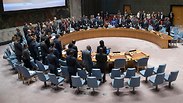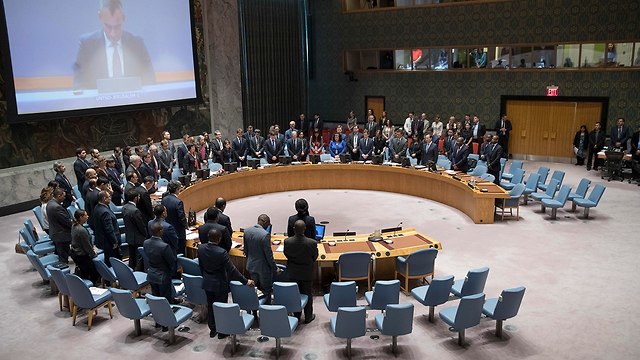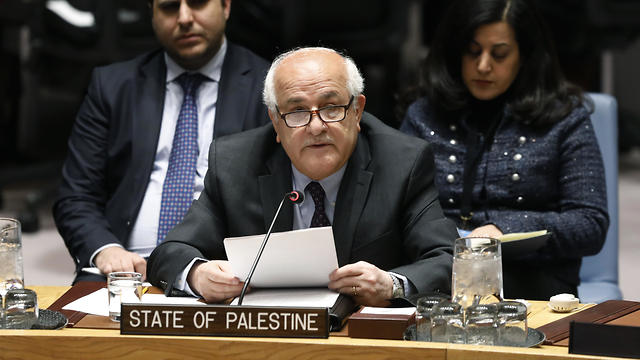
United Nations Security Council observe a moment of silence for those killed in the Gaza Strip
Photo: AP
The Palestinian ambassador at the United Nations said Monday that the day will come when "obstacles" in the Security Council to full UN membership for Palestine will be removed "but that day is not today."

The main hurdle is the United States, a veto-wielding Security Council member which insists that the only way Palestine can gain full membership in the United Nations is after negotiating a peace deal with Israel.
"We disagree with them on that," Ambassador Riyad Mansour told a group of journalists. "We believe that our statehood, and our admission, is an innate right for the Palestinian people ... to exercise it alone. It is not open for negotiation with anyone—nor will we ask for permission from anyone."
Mansour said the legal right for Palestine to be a full member of the United Nations was formalized in the 1947 General Assembly resolution that partitioned British-ruled Palestine into "independent Arab and Jewish states."
Israel was accepted as a UN member, he said, and Palestine which "will continue fighting for that right."
The Palestinians initially had observer status at the UN, but in 2012 the 193-member General Assembly raised their status to an "observer state," giving Palestine a green light to join international organizations. Earlier this month, Palestine became chair of the largest voting bloc at the UN—the 134-nation Group of 77.
Mansour stressed that "negotiation is different than expressions of self-determination."
He noted that America's 13 colonies didn't negotiate with England in 1776 when they declared independence, and Israel didn't negotiate its independence declaration in 1948.
Since then, Mansour said, "we have negotiated, and we could possibly, if the conditions are right."

United Nations Security Council observe a moment of silence for those killed in the Gaza Strip (Photo: AP)
But the Palestinians' distrust of US President Donald Trump's administration has escalated because of its pro-Israel stance, and has all but ended prospects of Israeli-Palestinian talks.
The Palestinians cut off ties with the administration over a year ago after Trump recognized contested Jerusalem as Israel's capital. And a surge in Israeli settlement construction and planning on land the Palestinians want for their future state has added to tensions.
Palestinian President Mahmoud Abbas has said he will reject any peace plan the Trump team presents. The long-awaited plan is expected to be released after Israeli elections on April 9.
As for the prospect of revived Israeli-Palestinian negotiations, Mansour said if Jerusalem and Palestinian refugees are off the table, and settlements are "more or less off the table, what is there left to negotiate?"
He said Israel is violating the 1993 Oslo Accords signed by Israel and the Palestinians which stipulates that Jerusalem, refugees, settlements, borders and other issues are final status issues to be negotiated directly—"and not one party to decide unilaterally the fate of any of these issues."

















